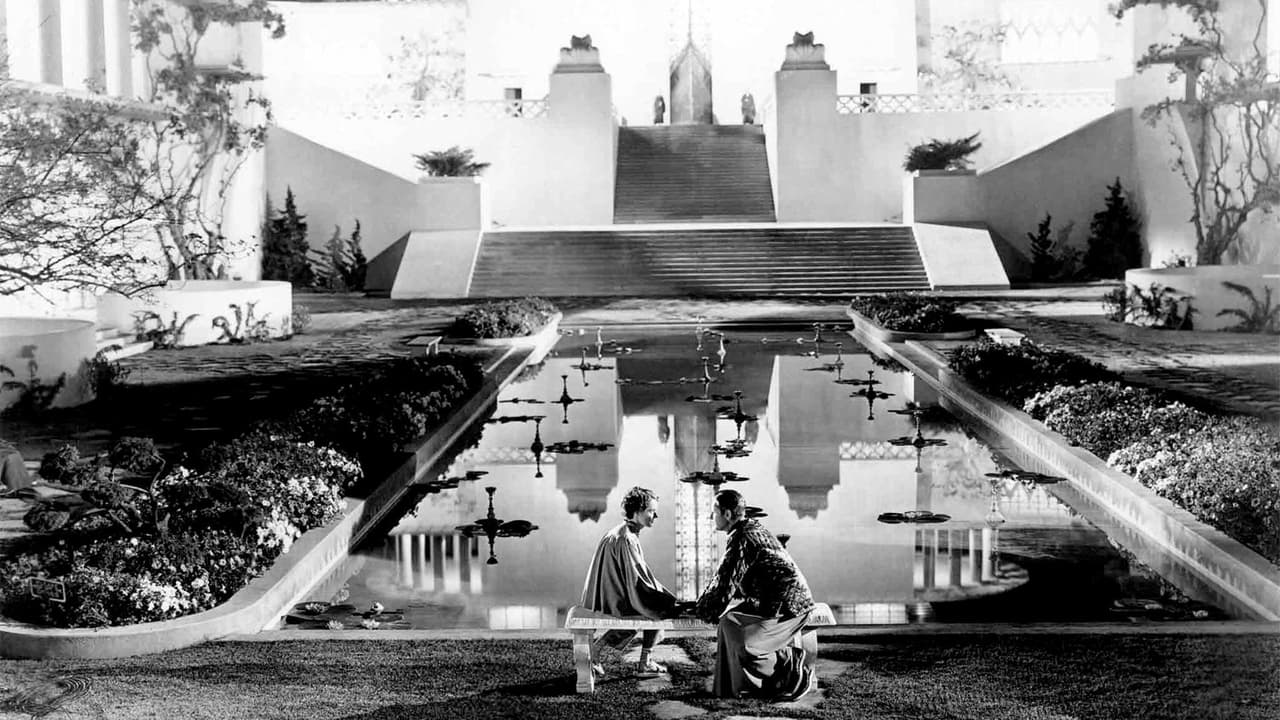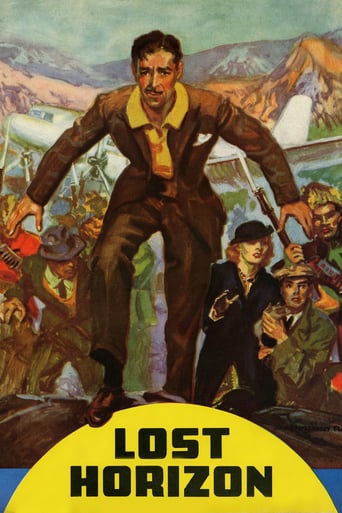TrueJoshNight
Truly Dreadful Film
Libramedi
Intense, gripping, stylish and poignant
ShangLuda
Admirable film.
Guillelmina
The film's masterful storytelling did its job. The message was clear. No need to overdo.
Kirpianuscus
and if it is more than fiction ? or useful propaganda tool against Communism ? or exotic story ? certainly, it is a different Capra. more cold, precise and realistic. but defined by the same spirit like his entire world. a plan clash. and a hidden world. a real Heaven at the first sigh. a sort of golden cage at the second. and interesting/provocative use of an old theme of humanity.a film about beauty and illusion and truth. remembering the work of Jules Verne and Sci. Fi. literature but giving more than another nice story. and this does Lost Horizon one of the films who has the status of experience. one who wake up memories from childhood.
classicsoncall
While watching, I had to wonder what movie viewers of the era must have thought just a couple of decades removed from the first World War while the nations of Europe and Asia seemed potentially headed for a second, eventually to involve the United States as well. Faced with the potential threat of fascist dictators and Imperial designs on the world, the prospect of a magical land of peace and long life must have seemed like the answer to one's prayers. But of course, one could reasonably lament during any period of the planet's history - "Look at the world today. Is there anything more pitiful"? There were some interesting concepts explored in the movie that for it's time, almost eighty years ago, seem like they're just being discovered today. There's High Lama Chang's (H.B Warner) declaration that age is a limit we impose on ourselves, and a modest understanding that one requires little to eat in order to live a long life. That latter idea is beginning to gain some resonance with modern longevity experts who have found that lowering one's caloric intake can actively promote one's health and well being.On the flip side however, I found Chang's attitude toward the treatment of women rather dismal and embarrassing, with Robert Conway's (Ronald Colman) apparent willingness to accept it somewhat troubling. Acquiescing to a rival's desire to be with one's woman/wife was made to sound noble during their discussion, but didn't speak very highly to the principles of loyalty or integrity. I'm actually surprised the subject was broached in the manner it was.The version of the film I viewed on Turner Classics at one hundred thirty two minutes was as complete as possible, a restored print version dating back to 1973 that fell seven minutes short of it's existing soundtrack. The lost footage was replaced by freeze frames and still images that take up the slack for the dialog that ensues, and holds up reasonably well for the story's continuity.
utgard14
Frank Capra classic about a group of British citizens, led by diplomat Robert Conway (Ronald Colman), who flee a rebellion in China only to have their plane crash in the Himalayas. They are taken to Shangri-La, a magical place isolated in the mountains where people can leave behind the worries of civilization. They learn they will live for hundreds of years there but only if they never leave. The world-weary Conway is intrigued by the promise of this utopia but not everyone in his group feels the same way.It's an ambitious undertaking for Capra, who made no other movies on the scale of this one (or with the budget). The costumes and Art Deco sets are beautiful. Great script from Robert Riskin, adapted from James Hilton's novel. Lovely, haunting score from Dimitri Tiomkin. Ronald Colman, an exceptional actor who never did a bad job that I've seen, gives a moving, sincere performance that ranks among the best of his impressive career. Sam Jaffe is also excellent in his small but important role as the High Lama. The rest of the wonderful cast includes John Howard, Jane Wyatt, Edward Everett Horton, H.B. Warner, Isabel Jewell, and Thomas Mitchell (the first of four movies he did with Capra). Jane Wyatt's swimming scene is probably the sexiest thing she ever did on film. The opening scenes are exciting and the climax is powerful. The middle of the film is where many people complain that it's slow or that it loses focus. I admit there is a chunk of the middle of the film, dealing with Colman and Wyatt falling in love, as well as everyone adjusting (or not adjusting) to Shangri-La that drags just a bit. But I never felt bored and I don't think it derails the film at all. The dialogue and performances in these scenes is still great. The original cut ran much longer and I can only imagine whether that version would be better or worse. As it is, seven minutes of footage is still missing from the current version. The dialogue for these scenes is intact, with production stills in place of the missing footage.It's escapism, pure and simple. Many viewers will poke holes in the idea and philosophy behind Shangri-La, calling it naive and childish. Perhaps they're right; perhaps the cold, cynical reality of selfish human nature means such a utopia is impossible. But the thing about most of Frank Capra's films, and why he is probably my favorite director ever, was that he believed in telling uplifting, optimistic stories about us helping each other overcome our baser nature; that good can triumph over evil and there are such things as happy endings. While Lost Horizon is not really one of his "Capra-corn" movies, I think the basic Capra elements are still there, right down to the final shot. Most other directors would have likely gone for the sad or tragic ending, but Capra gives us one that is hopeful.
faterson
This is Frank Capra at his best (and he's "at his best" in so many of his classics!), and he gets even better when his source material for a movie is as exquisite as James Hilton's famous original novel. You can feel there's a *lot more* behind this movie than what got into the final cut usually shown today -- the restored version of around 127 minutes. There's an overabundance, richness and depth of material to choose from -- after all, the initial cuts of the movie were 3.5 hours, or even 6 hours long. Too bad none of that footage is available today -- it would be a delight to watch.Capra, his screenwriter of many movies Robert Riskin, and Hilton are all "tuned to the same wave length", so what comes out is undiluted joy and harmony. Even if you don't know that Capra sometimes took *days* to shoot a single scene of a few minutes' length (overshooting his budget outrageously, and almost bankrupting Columbia studios), the tremendous care on his part is palpable throughout: he pays as much attention to action-packed scenes, as to properly leading the actors in every piece of dialogue.The actors' performances are as spectacular in _Lost Horizon_ as is the snow-deluged, but then again sunny and paradise-like, scenery. Ronald Colman is riveting as Robert Conway, and you can see why Capra only counted on him to play the role; there is, in particular, one pivotal scene of about 40 seconds' length, with the character of Conway considering whether to stay in Shangri-La; there's absolute silence throughout the scene -- but the play of expressions on Colman's face is fascinating; his face is like a mirror of his mind, or like the sky with clouds passing over it; I'm not sure if all of that was just Colman's improvisation or Capra's direction, but the scene may be the movie's top highlight.The other two actors present in that pivotal scene, John Howard (as the leading character's angst-ridden brother) and Margo (as the Russian "girl" Maria), are thoroughly convincing, too; the *intensity* with which they enact the two characters, is overpowering. So much so, that watching _Lost Horizon_ becomes incredibly suspenseful, surprising the viewer at every turn -- there seems to be a "new twist" every 5 minutes or so (particularly towards the end), as if _Lost Horizon_ was a mystery movie. You have a central leading character here (Robert Conway), in between two opposed sets of characters, each group trying to pull him in a different direction, claiming that *that's* where *true civilization* lies. Which way is Bob going to go? You're never really sure! The credit for that must go to both Colman and the fantastic actors portraying both sides of the divide -- you're as apt to "fall for" each of the two groups, as Bob's character did, at one stage or another.There are magnificent performances from others, too. It's as if Capra was able to squeeze the best out of every actor -- regardless of whether they only appear on the screen for a few minutes. Hugh Buckler only gets a few minutes of screen-time towards the end as Lord Gainsford, but how compelling is he! Thomas Mitchell has so many top-shelf movies to his credit, including possibly the greatest movies of all time (such as _Gone with the Wind_ and Capra's own _It's a Wonderful Life_), but nowhere have I seen him -- primarily a character actor -- shine so much as here in _Lost Horizon_ as the swindler Barnard. Isabel Jewell is similarly affecting as a terminally (?) ill patient getting rejuvenated by Barnard's (virtuously redirected) energy.H. B. Warner is wonderful as Chang, and makes the miracle of Shangri-La seem believable. His statement on the Westerners' celebration of birthdays is delivered unforgettably, as are others. The most difficult role in _Lost Horizon_ was that of the High Lama, played by Sam Jaffe. It's not surprising Capra went to extreme lengths (even swapping actors at one point) to get the High Lama's scenes right, and he eventually did. Although during _Lost Horizon_ previews the audience laughed at scenes meant to be serious, which drew Capra into depression, I believe that in the restored version of _Lost Horizon_ commonly shown today, the High Lama scenes strike just the right point to be perceived as serious and moving, while avoiding (just barely, but they do!) slipping into the ridiculous.The movie, besides being visually spectacular despite only being shot in black-and-white, also seems surprisingly fresh and bold for the standards of 1937 when it was made. Capra certainly didn't hesitate to show whatever he wanted to show: a naked Jane Wyatt (another great performance!) cavorting in a stream; a horde of naked children; and the High Lama extolling "Christian" virtues -- neither of which features would probably be considered politically correct today.The character of Sondra, enchantingly played by Jane Wyatt, is particularly admirable in that it was the film-makers' invention -- Sondra does not appear in Hilton's original book. On the superficial level, it's *just* the type of character that you might expect a clichéd Hollywood production to insert into the screen version of a novel, to make it more conventionally appealing; but in Riskin's and Capra's capable hands, clichés turn into magic, pure gold. See not only the nude bathing scene, but also the "Why?!" scene with Conway playfully "wringing the neck" of his beloved.Watching _Lost Horizon_, even 70+ years after it was made, is like getting a breath of that fresh mountain air that is alleged to keep you forever young in body and spirit in Shangri-La. Watching _Lost Horizon_ makes you feel as if you paid a visit to Shangri-La yourself -- can there be a higher achievement for an artist in any type of art?

